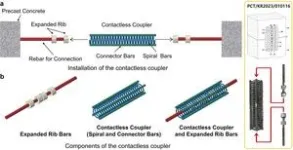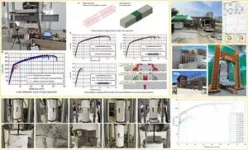(Press-News.org) CHICAGO – A deep learning artificial intelligence (AI) model that was developed using only mammogram image biomarkers accurately predicted both ductal carcinoma in situ (DCIS) and invasive carcinoma, according to research being presented today at the annual meeting of the Radiological Society of North America (RSNA). Additionally, the model showed no bias across multiple races.
Traditional breast cancer risk assessment models use information obtained from patient questionnaires, such as medical and reproductive history, to calculate a patient’s future risk of developing breast cancer.
“In the domain of precision medicine, risk-based screening has been elusive because we have not been able to accurately evaluate a woman’s risk of developing breast cancer,” said study lead author Leslie R. Lamb, M.D., M.Sc., a breast radiologist at Massachusetts General Hospital (MGH) in Boston. “Even the best existing traditional risk models do not perform well on the individual level.”
Traditional risk models have also demonstrated poor performance across different patient races, most likely due to the data used to develop the model.
“Traditional models likely have racial biases due to the populations on which they were developed,” Dr. Lamb said. “Several of the commonly used models were developed on predominantly European Caucasian populations.”
According to the American Cancer Society, Black women demonstrate the lowest 5-year relative survival rate for breast cancer among all racial and ethnic groups. This translates to a persistent 6% to 8% disparity in 5-year survival rates between Black and white women across all breast cancer types.
To accurately determine breast cancer risk, foster early detection and improve patient survival rates, it is important that risk models are developed that are applicable across different populations.
A deep learning AI risk assessment model developed using mammographic images alone can outperform traditional risk assessment models in future breast cancer development while also mitigating the racial biases seen in traditional models.
In the first study of its kind, Dr. Lamb and colleagues sought to assess the performance of an image-based deep learning risk assessment model in predicting both future invasive breast cancer and DCIS across multiple races.
The model’s performance was assessed by comparing areas under the receiver operating characteristic curve (AUC) with the DeLong test. The AUC score measures the predictive rate of the model on a scale of from 0 to 1. Multiple prior studies have estimated traditional risk model performance measured by AUC in the range of 0.59-0.62 for white women, with much lower performance in women of other races.
The multisite study included 129,340 routine bilateral screening mammograms performed in 71,479 women between 2009 to 2018 with five-year follow-up data. Patient demographics were obtained from electronic medical records, and instances of cancer were identified from the regional tumor registry.
The racial makeup of the study group included white (106,839 exams), Black (6,154 exams), Asian (6,435 exams), self-reported other races (6,257 exams) and unknown (3,655 exams). The mean age of the women was 59 years old.
The deep learning model consistently outperformed traditional risk models in predicting a woman’s risk of developing DCIS, which is early-stage breast cancer, and invasive breast cancer, which is cancer that has potential to spread.
“The model is able to translate the full diversity of subtle imaging biomarkers in the mammogram, beyond what the naked eye can see, that can predict a woman’s future risk of both DCIS and invasive breast cancer,” Dr. Lamb said. “The deep learning image-only risk model can provide increased access to more accurate, equitable and less costly risk assessment.”
The predictive rate of both DCIS and invasive cancer was 0.71 across all races. The AUC in predicting DCIS was 0.77 in non-white patients and 0.71 in white patients. The AUC in predicting invasive cancer was 0.72 in non-white patients and 0.71 in white patients.
“This is a particularly exciting domain for AI, as it demonstrates the opportunity to apply ‘AI for good’—to reduce well-known racial disparities in risk assessment,” said senior author Constance D. Lehman, M.D., Ph.D., a breast radiologist at MGH. “We are now poised to translate these findings into improved clinical care for our patients.”
Additional co-authors are Sarah F. Mercaldo, Ph.D., and Andrew R. Carney, M.S.
###
Note: Copies of RSNA 2023 news releases and electronic images will be available online at RSNA.org/press23.
RSNA is an association of radiologists, radiation oncologists, medical physicists and related scientists promoting excellence in patient care and health care delivery through education, research and technologic innovation. The Society is based in Oak Brook, Illinois. (RSNA.org)
Editor’s note: The data in these releases may differ from those in the published abstract and those actually presented at the meeting, as researchers continue to update their data right up until the meeting. To ensure you are using the most up-to-date information, please call the RSNA Newsroom at 1-312-791-6610.
For patient-friendly information on breast imaging, visit RadiologyInfo.org.
END
Research Highlights:
People diagnosed with coronary heart disease had a significantly increased risk of developing dementia later in life, according to an analysis of data for more than 430,000 people from the UK Biobank.
Participants who had coronary heart disease before age 45 had a 36% increased risk of developing dementia, a 13% increased risk of developing Alzheimer’s and a 78% greater risk of developing vascular dementia compared with participants who did not have coronary heart disease.
Men and women diagnosed with coronary heart disease before age 45 were significantly more likely to develop dementia than their counterparts who ...
Young male gym users are largely unaware of the risks of their lifestyle on their fertility, a new study shows.
New results from a survey of 152 gym enthusiasts, published in Reproductive BioMedicine Online found that men were largely unaware of the risks to their fertility from aspects of gym lifestyle including protein supplements, which can contain high levels of estrogen, used by 79% of male respondents.
When questioned about their concern about fertility, more than half (52%) of male participants said that they had thought about their ...
New Haven, Conn. — Yale paleontologists have identified a new fossil lizard, found in the western United States, which they say was an ancestor of modern geckos. And they gave it a name that honors the lead researcher’s grandmother and great aunt.
The discovery of the new species, which they named Helioscopus dickersonae, suggests that gecko ancestors appeared in North America much earlier than previously known.
“This discovery emerged from a larger investigation of two fossil lizard skulls from Dinosaur National Monument in Utah,” said Dalton ...
A 20-year Australian study has found no evidence to suggest cannabis reduces illicit opioid use, and it may not be an effective long-term method of reducing harm for those with an opioid use disorder or problematic use of opioids.
Published in the American Journal of Psychiatry, the University of Sydney led study is one of the longest of its kind.
Between 2001 to 2022, the study involved a group of 615 people with heroin dependence, many of whom also used cannabis.
Additional analysis also found no consistent evidence between cannabis and other opioid use, ...
WASHINGTON – Debunking, “prebunking,” nudging and teaching digital literacy are several of the more effective ways to counter misinformation, according to a new report from the American Psychological Association.
Written by a panel of U.S. and international experts on the psychology of misinformation, the report outlines the processes that make people susceptible to misinformation and offers solutions to combat it.
People are more likely to believe misinformation if it comes from groups they belong to or if they judge the source as credible, according to the report “Using Psychological Science to Understand and Fight Health Misinformation: An ...
Smartphones have altered human behavior in complex ways but context can also alter smartphone use. Laura Alessandretti and colleagues analyzed a dataset of 464,455 smartphone users from around the world, with 324,391 users categorized as urban and 52,290 categorized as rural. In most countries, urban users spent more time on their phones, using them for an average of 174.9 minutes a day, compared to 152.2 minutes for rural users. Urban users were more likely than rural users to spend time on apps categorized as maps and navigation (+150.0%), news (+38.7%), travel and local (+28.7%), music (+20.0%), business (+19.3%), and productivity (+13.7%) while rural users were more likely that urban users ...
The COVID-19 pandemic continues to reshape the workforce, with almost half of Australian workers willing to sacrifice part of their annual salary to work from home.
New research by the University of South Australia has found that 45% of workers would be willing to accept a pay cut in exchange for remote work flexibility.
A survey of more than 1100 Australian workers in 2020-21 found that the average worker, who can carry out their role effectively at home, is willing to give up $3000 to $6000 in annual wages (4 to 8% of their salary). One fifth of participants would be willing to sacrifice $12 to $24,000 annually (16 to 33% of salaries).
However, ...
Blue light-emitting diodes represent a fundamental element in the contemporary lighting and display technology landscape. Like prevailing technology such as III-V, organics and quantum dot LEDs, developing efficient and stable blue perovskite light-emitting diodes (PeLEDs) is a formidable challenge. Over the past few years, the research community has experienced a remarkable upsurge in the external quantum yields of blue PeLEDs, bringing them closer to the level of more mature technologies. Nevertheless, these blue PeLEDs continue to ...
The more time pre-schoolers spent in childcare during the first year of the pandemic, the more their vocabulary grew, a new study has found.
Research led by the University of Leeds found that attending Early Childhood Education and Care (ECEC) during the Covid-19 outbreak had sustained benefits for youngsters’ development.
Academics investigating the ongoing impact of Covid-related closures found that for each day of the week spent in ECEC, toddlers could produce an average of 29 more new words over the first year of the pandemic and ...
A research group led by Nagoya University’s Graduate School of Engineering has uncovered how rapid tendon regeneration occurs in newts. The research, published in the Journal of Orthopaedic Research, compared the regeneration mechanism of damaged tendons in newts with those in mice. In the future, their findings could help physicians to treat human athletes recovering from tendon injuries.
Tendon injuries are a serious obstacle for athletes, who currently require several months ...




